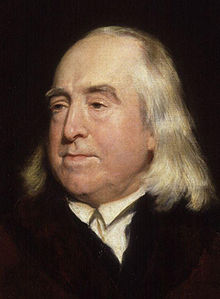Jeremy Bentham
| Jeremy Bentham | |
|---|---|
 |
|
| Born |
15 February 1748 London, England |
| Died | 6 June 1832 (aged 84) London, England |
| Alma mater | The Queen's College, Oxford (BA 1763; MA 1766) |
| Era |
18th century philosophy 19th century philosophy |
| School | Utilitarianism, legal positivism, liberalism |
|
Main interests
|
Political philosophy, philosophy of law, ethics, economics |
|
Notable ideas
|
Greatest happiness principle |
|
Influences
|
|
|
Influenced
|
|
| Signature | |
 |
|
Jeremy Bentham (/ˈbɛnθəm/; 15 February 1748 [O.S. 4 February 1747] – 6 June 1832) was an English philosopher, jurist, and social reformer. He is regarded as the founder of modern utilitarianism.
Bentham defined as the "fundamental axiom" of his philosophy the principle that "it is the greatest happiness of the greatest number that is the measure of right and wrong". He became a leading theorist in Anglo-American philosophy of law, and a political radical whose ideas influenced the development of welfarism. He advocated individual and economic freedom, the separation of church and state, freedom of expression, equal rights for women, the right to divorce, and the decriminalising of homosexual acts. He called for the abolition of slavery, the abolition of the death penalty, and the abolition of physical punishment, including that of children. He has also become known in recent years as an early advocate of animal rights. Though strongly in favour of the extension of individual legal rights, he opposed the idea of natural law and natural rights, calling them "nonsense upon stilts".
...
Wikipedia
